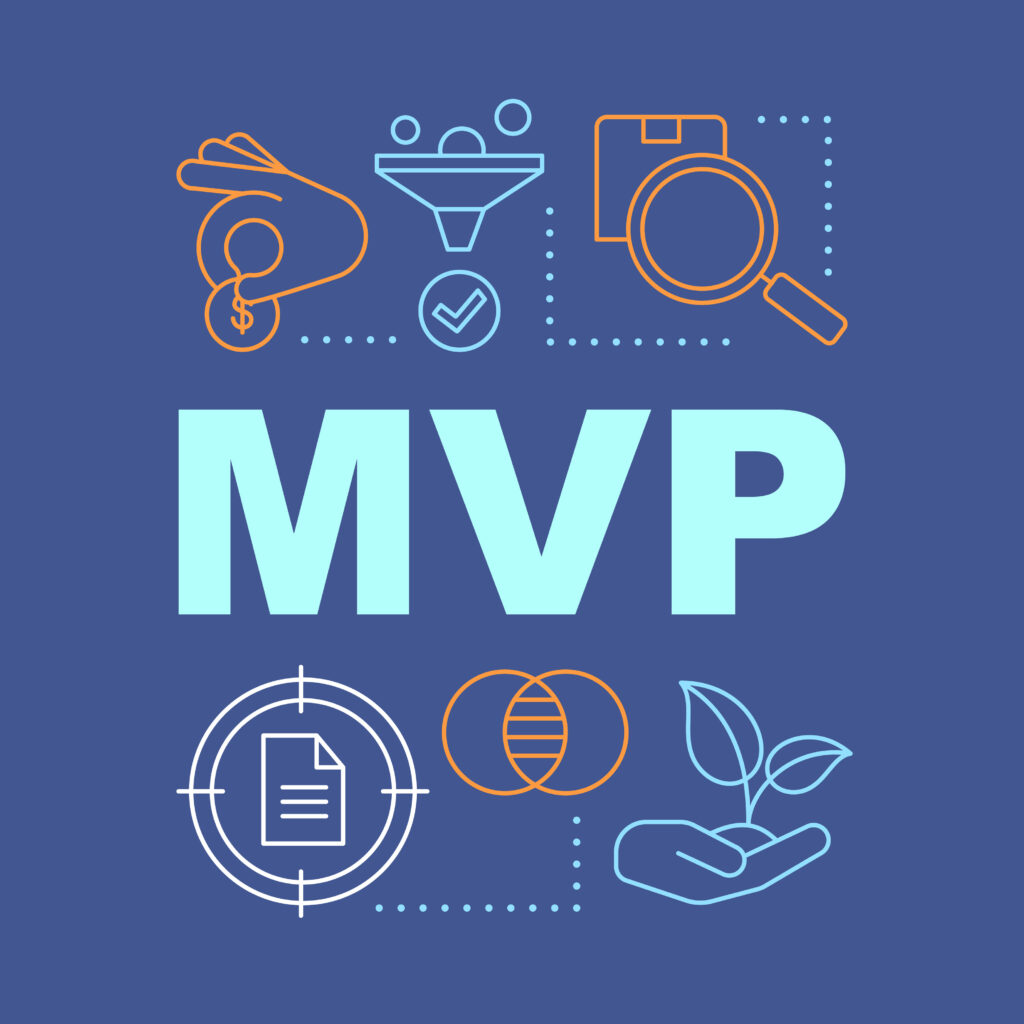Let’s start by saying: you have a brilliant healthcare software idea that can improve and save lives. Your next step will determine your success or failure, especially if you have limited software development experience. This is when a healthcare MVP software comes into place.
But how to best utilize it and minimize the downsides? This blog discusses what the healthcare software MVP is and the common pitfalls to avoid.
What is a Healthcare Software MVP?

A “most viable product” (MVP) approach overcomes common pitfalls to get your life-improving, compliant healthcare technology to patients and doctors sooner.
The MVP approach
The MVP approach draws the roadmap for you to define, build, and market-test a quality first version of your software. Such healthcare MVP software can forge the discipline for your successful healthcare software launch.
Eric Ries, an expert in launching successful startups using lean methodology, created and defined the term MVP: “The minimum viable product is the version of a new product that allows a team to collect the maximum amount of validated learning about customers with the least effort.”
A healthcare MVP software development can get your product to market quickly, with shorter development cycles and fast customer feedback. Developers can respond to measured user needs without managing bloat from non-essential features. This lets you iterate and create more robust versions with additional features. But an MVP is not just a bare minimum of features. It still must effectively address your customers’ priority problems to make their lives better.
Minimum Viable Means Unique, Important Things in Healthcare
Any software MVP in any industry plan must consider common things, such as user experience and interface, cloud hosting options, and performance and scaling metrics.
Meanwhile, Healthcare MVP software has some special, unique minimum requirements:
Absolutely protect the privacy of every glimpse of patient health information (PHI).
The HIPAA Privacy Rule has long established and refined the requirements for protecting PHI in software. Your healthcare MVP software must identify where your testing process will potentially store or share PHI (as well as that of your tech partners). Your development requirements must specify what tools will protect PHI (such as encryption and authentication) and show compliance. As a new software venture, you should solicit guidance from a healthcare security compliance expert to establish rock-solid MVP security requirements.
Interoperability — Play well with other healthcare systems.
Healthcare MVP software must work effectively in the flow of many existing IT and data systems. Use the best, right technologies to make all systems talk to each other in the ways that best enable exceptional care and patient access.
Make your users smile more often.
Vendors developed EHRs with little input from the physicians, which has led to decades of frustration among doctors who feel they spend far more time with computers than patients. Always remember that your technology must make satisfying quality care better and easier for nurses, doctors, and patients who hate redundant effort and data input. Your healthcare MVP software must aspire to make the healthcare experience better and happier for everyone.
Common Healthcare MVP Software Pitfalls to Avoid

- Underestimating the effort, cost, and resources you need to succeed.
Startups often just don’t have the engineering teams and direction in place to launch a successful healthcare MVP software.
Established software vendors have resource challenges as well. They understandably devote more resources to core products with a reliable revenue stream, often squeezing out innovation.
And it’s not just engineers. Your healthcare MVP software endeavor needs product management, QA, testing, marketing, beta program management, and other functions depending on your vision.
What does that new budget or pro forma look like? What’s it worth to get that return? It is necessary to strategically and confidently draft out what it takes to make your vision succeed, in terms of personnel, equipment, and required budget.

- Ready, fire, aim.
We’ve all heard stories about maverick code slingers creating breakthrough software in their garage. Ignore those stories. Architects should design before engineers build. A healthcare MVP software like this ensures that your product works reliably and does what you set out to do.
- Finding and Hiring Specialized Healthcare Software Developers.
Quality developers and testers are scarce in every corner of the software industry. The “Great Resignation”, new employee expectations for remote work, and increasing global competition reduce the supply and increase the costly demand for exceptional software engineers.
Now amplify those hiring challenges for healthcare specialization. FHIR and SMART on FHIR. The Internet of Medical Things. AI and machine learning. There’s a limited pool of specifically skilled engineers — making it harder to find, pay, and keep them.
- Burning initial funding without enough product to secure more.
Smart startups are looking ahead at each stage of funding they’ll need and how to secure it. Investors want to see product progress and market feedback that boosts their confidence in contributing to later rounds of funding. That is when healthcare MVP software can help.
- Shrinking budgets stifle innovation.
Tight budgets claim innovation as their victim. Here healthcare MVP software can stumble when leaders do not have the confidence or courage to invest in success.
- Trying to jam everything into version one.
You’ve set out to change the world of healthcare, and your mind is spinning with ideas for the sleekest, most comprehensive solution ever created. So paring down the features your healthcare MVP software needs can be a downright emotional challenge.
- Over-customizing for the end user.
Your first healthcare MVP software doesn’t need to give every user every option to configure every feature and screen. The key goes back to focusing on the problem you’re solving, and for whom you’re solving it.
- Adding buzzy technology your MVP might not need.
An example: Artificial intelligence and machine learning are powerful evolving technologies that can get precise answers from vast amounts of patient data and automate everything from surgical procedures to claims processing. But your use cases and specifications might point to a simpler algorithm that will deliver what your healthcare MVP software needs with less effort.
- Starting without a product or marketing manager.
Excellent product managers and marketers turn big partner and executive software visions into market and investor success. The product folks are smarter than founders and executives about how to get profitable software to market successfully. Ignore them at your peril.
MVP Development for Healthcare Organizations

Choose KMS Healthcare as your partner. A team of experienced developers can get you started much closer to the finish line with:
- A healthcare-experienced development team that can ramp up immediately
- Consulting guidance to ensure a successful delivery
- Skilled data scientists, AI/ML engineers, and leaders in emerging healthcare technologies
- Proven healthcare MVP development methodology for startups and enterprises
- Real-world experience from successfully launching our own healthcare MVP software
Contact KMS Healthcare to learn more about our positioning as a top healthcare software development company.

